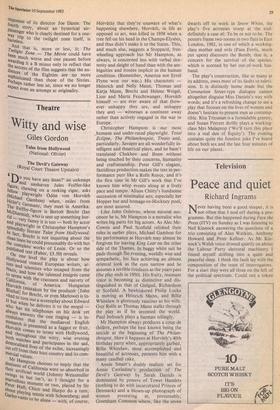Theatre
Witty and wise
Giles Gordon
Tales from Hollywood (National: Olivier) The Devil's Gateway
(Royal Court Theatre Upstairs) 6 Do you have any linen?' an unkempt , and unshaven Jules Feiffer-like "gure, chewing on a reeking cigar, asks fellow playwright Odtin von Horvath (hlichael H ' Gambon) when, exiles from ulers Germany, they meet in Amerika. The .Feiffer-figure is Bertolt Brecht (Ian M. eplarmid), who is sent up something hor- and Pl funny it is too — both by actor aYwright in Christopher Hampton's s,Plendidly literate Tales from Hollywood. la
clea fact, Brecht is not inquiring about the th n linen he could presumably do with but e complete works of Lenin. Or so the Published text (Faber, £3.50) reveals.
„ On one level the play is about how 7011ywood treated European writers, ar- tists and scientists who escaped from the Nazis, and how the talented émigrés came to t.erms with the crassness and naivety of H California, of America. Hungarian orvath (mistaken by the producer [J. in [John Bluthal] for Brecht, or even Marlowe) is - _vited to turn out a screenplay about Edward who but when he delivers it to the mogul — has six telephones on his desk yet always answers the one ringing — is in- that
credulous the mediaeval English Hor monarch is presented as a faggot or fruit. vath
a comes to terms with Hollywood, b. and throughout the witty, wise evening d oth watches and participates in the sad, emoralised lives of the exiles, increasingly
Ctn.
Off from their host country and its com- mercial values.
M i
Mr Hampton chooses to imply that the denizens of California were so absorbed n their artificial world (Johnny Weissmuller swings in but isn't, as I thought for a Marvellous moment or two, played by Sir Peter
about Hall; Chico and Harpo do a turn, Playing tennis with Schoenberg; and Garbo vants to be alone — with, of course,
Horvath) that they're unaware of what's happening elsewhere. Horvath, in life as opposed to art, was killed in 1938 when a tree fell on his head in the Champs-Elysees, and thus didn't make it to the States. This, and much else, suggests a Stoppard, free- wheeling approach but Mr Hampton, as always, is concerned less with verbal dex- terity and sleight of hand than with the am- biguities and ironies implicit in the human condition. (Remember, America not Errol Flynn won our war.) His characters — Heinrich and Nelly. Mann, Thomas and Katja Mann, Brecht and Helene Weigel, Lion and Marta Feuchtwanger, Horvath himself — are ever aware of that (how- ever unhappy they are, and unhappy they are) — witnesses a continent away rather than actively engaged in the war in Europe.
Christopher Hampton is our most , humane and under-rated playwright. Total Eclipse, The Philanthropist, Treats and, particularly, Savages are all wonderfully in- telligent and theatrical plays, and he hasn't translated Chekhov and ' Ibsen without being touched by their concerns, humanity and craftsmanship. Peter Gill's elegant, fastidious production makes the text in per- formance purr like a Rolls Royce, and it's the first time in Mr Gill's work that I've known him whip events along at a lively
• pace and tempo. Alison Chitty's handsome succession of minimalist sets, especially her Hopper bar and homage-to-Hockney pool, are most assured.
Like John Osborne, whose natural suc- cessor he is, Mr Hampton is a moralist who writes big parts for big actors. As Alec Mc- Cowen and Paul Scofield relished their roles in earlier plays, Michael Gambon for his performance as Horvath may almost be forgiven for leaving King Lear on the other side of the Thames. In baggy white suit he pads through the evening, worldly wise and sympathetic, his face achieving an almost oriental look as the eyes narrow and he assumes a terrible tiredness as the years pass (the play ends in 1950), His fruity, resonant voice is becoming as distinctive and dis- tinguished as that of Gielgud, Richardson or Scofield. A bewhiskered Philip Locke is moving as Heinrich Mann, and Billie Whitelaw is gloriously raucous as his wife. Guy Rolfe as Thomas Mann stalks through the play as if he invented the world. Paul Imbusch plays a barman tellingly.
Mr Hampton always produces a coup de theatre, perhaps the best known being the suicide at the beginning of The Philan- thropist. Here it happens at Horvath's 40th birthday party when, appropriately garbed, Billie Whitelaw, most accomplished and beautiful of actresses, presents him with a many candled cake.
Annie Smart's drably realistic set for Annie Castledine's production of The Devil's Gateway by Sarah Daniels is
dominated by posters of Tower Hamlets (nothing to do with incarcerated Princes of Denmark) and a blown-up photograph of women protesting at, presumably, Greenham Common where, like the seven
dwarfs off to work in Snow White, the play's five actresses troop at the end: definitely a case of: To be or not to be. The posters frame two rooms in two flats in East London, 1982, in one of which a working- class mother and wife (Pam Ferris, much put upon) discovers the Bomb; that is, a concern for the survival of the species, which is scorned by her out-of-work hus- band.
The play's construction, like so many at its address, owes most of its faults to televi- sion. It is distinctly home made but the Coronation Street-type dialogue cannot altogether disguise Miss Daniels's way with words; and it's a refreshing change to see a play that focuses on the lives of women and doesn't hesitate to present men as contemp- tible. Rita Triesman is a formidable granny, and Susan Porrett shrilly plays a working- class Mrs Malaprop ('We'll turn this place into a real den of Equity'). The evening contains quite the funniest joke I've heard about both sex and the last four minutes of life on our planet.






































 Previous page
Previous page